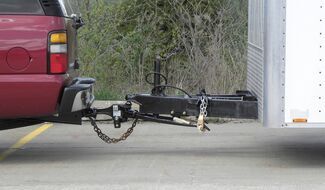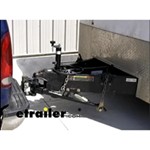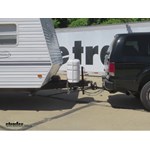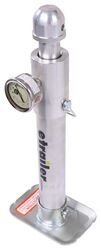
Determining Loaded Tongue Weight to Pick Out a Weight Distribution for a 2001 Jayco Kiwi 23-B Camper
Products Featured in This Question
Question:
I brought my camper home this weekend. I used the bathroom scale method to get my tongue weight. I have calculated it to be 580 pounds. Our camper is loaded up with most of what we’ll be camping with. I know that to make the best determination, it should be loaded as we will use it when camping. Having said that, all of our bedding, utensils and what not is in our camper. The things we will add for a trip would be clothing and food for a family of five (two adults, three children). When we tow the camper, I will not have any fresh water on board, and the waste tanks will be empty. While straightening out the camper, my wife found a printed sticker in one of the cabinets. It lists the weight ratings as such: GVWR: 4950 Approximate UVW: 4141 NCC: 809 I’m sure you already know this, they define UVW as unloaded vehicle weight, and NCC as net carrying capacity. So with all that, what are your recommendations?
asked by: Brian S
Helpful Expert Reply:
I was able to find the weight of your trailer dry, but you will want to contact Jayco to determine how much capacity your trailer has, because this will make a difference if your Jayco can support the weight that's been loaded into the camper. The dry weight listed for the camper is 3665lbs.
Tongue weight usually is about 10-15 percent of that weight but for the best ride quality and the best weight distribution hitch that will provide this, we will want to know what your loaded tongue weight is.
Another option would be to measure the loaded tongue weight of your trailer with a scale like the etrailer # e99044 scale under the jack foot to measure your tongue weight. If you get back to me with this number, I will be more than happy to help you select the proper weight distribution system for your needs.
You will want to make sure the trailer is disconnected from the truck when taking this measurement. I have linked a Help Article on how to determine tongue weight for your convenience.

Product Page this Question was Asked From
etrailer Tongue Weight Scale for Campers and Utility Trailers - 2,000-lb Capacity
- Tongue Weight Scale
- Analog Scale
- 2000 lbs
- etrailer
more information >
Featured Help Information
Instructions
Miscellaneous Media






Continue Researching
- Article: Determining Trailer Tongue Weight
- Article: 2 Steps for Finding the Right Weight Distribution Hitch Size
- Q&A: Comparing The etrailer # e99044 And Big Truck Big RV # BTBRV44FR Tongue Weight Scales
- Article: 5 Things to Know About Weight Distribution Hitches
- Article: How to Measure for Trailer Hitch Drop
- Q&A: Is It Safe To Use A Weight Distribution Hitch That's Overrated For Your Trailer
- Q&A: Best Tongue Weight Scale That's EASIEST To Use
- Article: 5 Tips to Confidently Choose Your Weight Distribution Hitch
- Q&A: Does etrailer Sell the Big Truck Big RV (BTBRV) Tongue Weight Scale?
- Q&A: Is B&W Digital Tongue Weight Scale Compatible With 5th Wheel and Gooseneck Trailers
- Q&A: Can The Big Truck Big RV Tongue Weight Scale # BTBRV44FR Connect To A Trailer Jack
- Article: Which Sway Control Hitch is Right For Your Trailer?
- Q&A: What Size Hitch Ball Works With a Weigh Safe Hitch W/ Built In Scale
- Article: Trailer Wiring Diagrams












Brian
4/27/2016
I brought my camper home this weekend. I used the bathroom scale method to get my tongue weight. I have calculated it to be 580 pounds. Our camper is loaded up with most of what we’ll be camping with. I know that to make the best determination, it should be loaded as we will use it when camping. Having said that, all of our bedding, utensils and what not is in our camper. The things we will add for a trip would be clothing and food for a family of five (two adults, three children). When we tow the camper, I will not have any fresh water on board, and the waste tanks will be empty. While straightening out the camper, my wife found a printed sticker in one of the cabinets. It lists the weight ratings as such: GVWR: 4950 Approximate UVW: 4141 NCC: 809 I’m sure you already know this, they define UVW as unloaded vehicle weight, and NCC as net carrying capacity. So with all that, what are your recommendations?